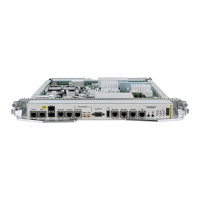BFD per interface configuration is supported for OSPF, OSFPv3, IS-IS, and MPLS-TE only. For information
about configuring BFD on an OSPFv3 interface, see Enabling BFD for OSPFv3 on an Interface.
Note
SUMMARY STEPS
1.
configure
2.
bfd multipath include locationnode-id
3.
router ospf process-name
4.
bfd minimum-interval milliseconds
5.
bfd multiplier multiplier
6.
area area-id
7.
interface type interface-path-id
8.
bfd fast-detect
9.
commit
10.
show run router ospf
DETAILED STEPS
PurposeCommand or Action
configure
Step 1
(Optional) Enables BFD multipath for the specified bundle on the
interface. This step is required for bundle interfaces.
bfd multipath include locationnode-id
Example:
RP/0/RSP0/CPU0:router(config)# bfd
multipath include location 0/0/CPU0
Step 2
Note
•
This step must be repeated for every line card that
has a member link in the bundle interface.
Enters OSPF configuration mode, allowing you to configure the
OSPF routing process.
router ospf process-name
Example:
RP/0/RSP0/CPU0:router(config)# router ospf
0
Step 3
Use the show ospf command in EXEC configuration mode to
obtain the process-name for the current router.
Note
•
To configure BFD for IS-IS or MPLS-TE, enter the
corresponding configuration mode. For example,
for MPLS-TE, enter MPLS-TE configuration mode.
Sets the BFD minimum interval. Range is 15-30000 milliseconds.
bfd minimum-interval milliseconds
Step 4
Example:
RP/0/RSP0/CPU0:router(config-ospf)# bfd
minimum-interval 6500
This example sets the BFD minimum interval to 6500 milliseconds.
Sets the BFD multiplier.
bfd multiplier multiplier
Step 5
Cisco ASR 9000 Series Aggregation Services Router Routing Configuration Guide, Release 5.3.x
257
Implementing BFD
Configuring BFD Under a Dynamic Routing Protocol or Using a Static Route

